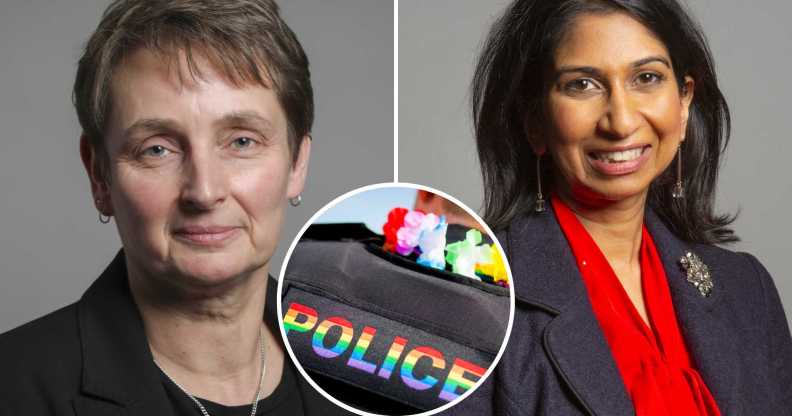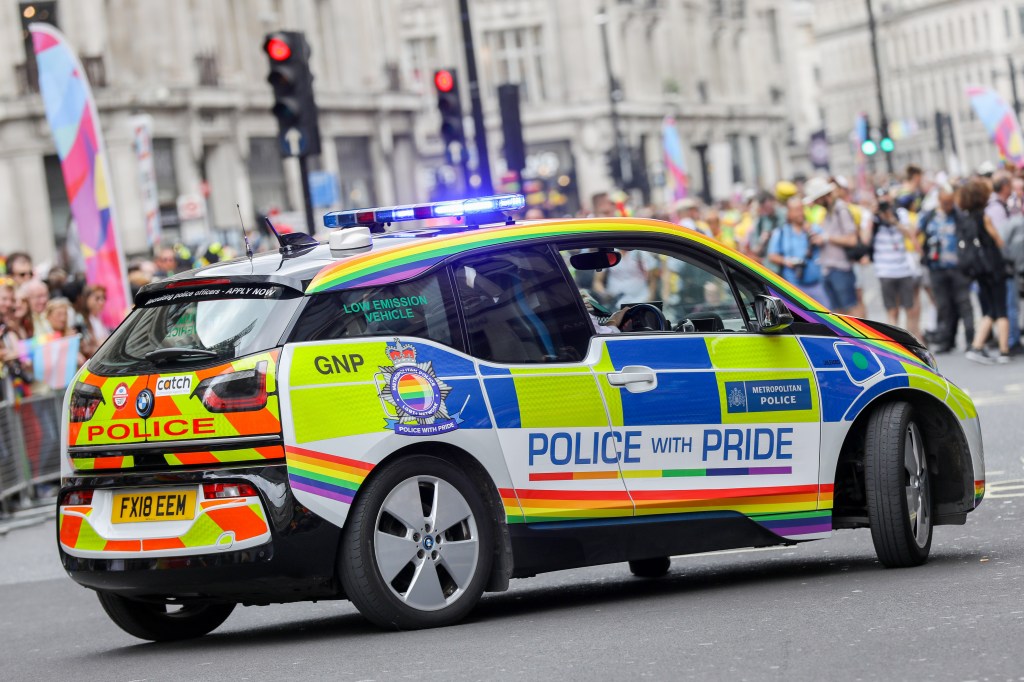Kate Osborne blasts Suella Braverman’s ‘woke policing’ claims: ‘Legitimising hate’

Kate Osborne has criticised Suella Braverman’s comments on ‘woke’ policing. (GIOV/Tristan Fewings/Getty Images)
Labour MP and veteran LGBTQ+ activist Kate Osborne has slammed Suella Braverman’s claims about policing becoming “woke”, after the home secretary shamed officers for “dancing and fraternising” with LGBTQ+ people and “waving the Progress [Pride] flag”.
Jarrow MP Osborne wrote in Labour Outlook that it is not “woke policing” which is damaging trust with communities, but “government’s damaging inflammatory rhetoric” and historic issues within Britain’s police forces.
“Braverman knows that community engagement is vital to build trust, to help fight crime and to support communities, yet instead she is criticising police for trying to do just that,” she wrote, adding that the Tory minister’s rhetoric is “designed to whip up hate and divide communities” and “further marginalise some of the most vulnerable”.
Earlier this month, the home secretary ordered a review into “political activism” in the police force, saying the police should “focus on tackling crime” and not get involved in “political matters”.
Such “political” acts include the waving of Pride flags, which she said “symbolises highly contested ideologies”, apologising for being “institutionally racist” and “encouraging the uptake” of “critical race theory, gender ideology, or eco-extremism, as useful frameworks for policing”.
Braverman wrote in an open letter at the time: “The British people expect their police to focus on cutting crime and protecting communities.
“Political activism does not keep people safe, solve crimes or support victims, but can damage public confidence.”
“In all of these examples, public confidence was damaged by the sight of a supposedly apolitical police force siding with one group over another in a currently contentious area of public debate,” the controversial home secretary continued.
“In all of these examples, the public’s respect for policing was eroded.”

Osborne noted that even when police forces attempt to address issues of historic and continuing misogyny, racism or homophobia – to build better trust with communities – Braverman “dismissed them as ‘woke’”.
“She makes these comments in full knowledge of the history of discrimination against women, LGBTQ+ and BAME communities, in full knowledge of our communities being failed by police forces and the judicial system and in the knowledge that rhetoric like this allows discrimination to thrive,” the Labour backbencher wrote.
“This continuation of this government’s culture war gives the clear message that it’s okay to discriminate, that the police shouldn’t try to be inclusive or understand the communities they serve.”
She added that using language such as “contested ideologies” and “partisanship” “legitimises hateful homophobic and racist rhetoric” and contributes to rising hate crime figures.
“We can all see the damage this zombie government are doing to our country, their culture war on woke is designed to distract from that – it won’t – but it will have a harmful impact on some of the most vulnerable,” she continued.
“This government needs to accept that many police forces have an issue with institutional misogyny, sexism and racism and focus on delivering institutional change around leadership and training.”
Osborne suggested areas the government should focus on, including encouraging closer community partnerships, restoring neighbourhood officers and ensuring staffing levels to give the public “confidence that, when a crime is committed, someone will help them”.
‘Opens the doors to a rhetoric of discrimination’
Braverman’s comments were also criticised by Paul Fotheringham, the president of the Police Superintendents’ Association (PSA), during a speech at the PSA Conference on 12 September.
“The language being used here matters”, he said, noting that when the government uses such language, it positions policing as “political rather than inclusive”, which opens “the doors to a rhetoric of discrimination against those most vulnerable in our communities”.
Fotheringham continued: “The home secretary recently wrote to all chief constables to question some of the work in this area under the subject of political impartiality.
“She gave examples of police activity she felt had led to the damaging of public confidence by supposedly apolitical police forces siding with one group over another.
“She references ‘dancing and fraternising with political demonstrators’, which we assume relates to police attendance at Pride. She talks about the displaying of the Progress flag and the wearing of badges.
“These are deeply personal and passionate matters for our staff and our communities.”
The PSA president instead described these examples as “effective community engagement and a desire to promote and welcome inclusion”.
“Trust and confidence starts with how we treat our people,” he added. “If they cannot be their true selves at work, how can we expect them to police our communities in the best possible way?”

